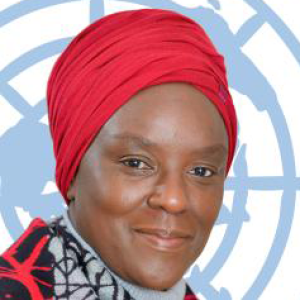HIS MAJESTY KING LETSIE III
THE RIGHT HONOURABLE THE PRIME MINISTER
HONOURABLE PRESIDENT OF THE SENATE
HONOURABLE SPEAKER OF THE NATIONAL ASSEMBLY
HIS LORDSHIP PRESIDENT OF THE COURT OF APPEAL
HIS LORDSHIP THE CHIEF JUSTICE
HONOURABLE DEPUTY PRIME MINISTER
HONORABLE MEMBERS OF PARLIAMENT
HONOURABLE MINISTERS AND DEPUTY MINISTERS OF HIS MAJESTY’S GOVERNMENT,
THEIR LORDSHIPS JUDGES OF THE COURT OF APPEAL AND THE HIGH COURT
EXCELLENCIES HEADS OF DIPLOMATIC MISSIONS
HEADS OF UN AGENCIES
PRINCIPAL SECRETARIES
SENIOR GOVERNMENT OFFICIALS
REPRESENTATIVES OF NON-GOVERNMENTAL ORGANISATIONS AND CIVIL SOCIETY
MEMBERS OF THE MEDIA FRATENITY
DISTINGUISHED GUESTS
BO MME LE BO NTATE ALL PROTOCOL OBSERVED
It is a profound honour to welcome you all to this high-level dialogue on the future of food security in Lesotho. On behalf of the entire UN family here in Lesotho, I extend our heartfelt gratitude to His Majesty King Letsie III. Your steadfast leadership and unwavering commitment to improving nutrition both here in Lesotho and globally, particularly through your role as the FAO Special Goodwill Ambassador for Nutrition, is indeed bringing these crucial issues of food security and nutrition to the forefront on an international scale. We are immensely grateful for your dedication.
We are also privileged to host this distinguished delegation from the United Nations, including FAO Director-General QU Dongyu, WFP Assistant Executive Director for Programme and Policy Development Valerie Guarnieri, and IFAD Associate Vice-President for Programme Management Donal Brown. Your presence underscores the importance of our collective efforts and solidarity in addressing food security.
The latest findings of the Lesotho Vulnerability Assessment report reveal a stark reality for many Basotho people: close to 700,000 will be food insecure in the 2024/2025 year, marking a 20% increase from 2023/2024. This crisis has been exacerbated by the El Niño-induced drought. Therefore, bo mme le bo ntate, the urgency of our mission cannot be overstated. The recent declaration of a state of food disaster by Prime Minister Samuel Matekane on 12 July 2024 highlights the critical nature of this situation.
The challenges we face are significant: poverty, food insecurity, climate change, gender-based violence, human rights violations, and unemployment are persistent barriers. The impacts of climate change threaten agricultural productivity and food security. Gender-based violence and human rights violations further undermine development efforts, disproportionately affecting women and children. Unemployment exacerbates poverty and limits access to nutritious foods.
When people go hungry, there is no peace. When children go hungry, there is no future. Hunger devastates not only individuals but entire communities, stripping away dignity and hope, and often leads to higher rates of unemployment, gender-based violence, and crime. Ensuring that communities have access to nutritious food is not just a matter of survival but really a cornerstone of sustainable development. Addressing hunger is essential to a stable society.
However, not all hope is lost because the strength of a nation lies in its ability to confront and overcome its greatest challenges. Through community involvement, robust public-private partnerships, and collaborative efforts, we can forge sustainable solutions. It is important that our efforts are inclusive, ensuring that disadvantaged communities, and those furthest left behind such as people with disabilities, receive equal opportunities to thrive.
The Government of Lesotho, through its National Strategic Development Plan II, has recognized the importance of enhancing agricultural production and resilience to ensure sustainable development. This high-level dialogue aims to explore strategies that will harness our country's potential, strengthen investment in our agricultural sector, and support our efforts to build a resilient food system.
This visit coincides with Lesotho’s celebration of 200 years since its founding. August, recognized as Food Month, marks a period when Basotho traditionally start planting according to the agricultural calendar. This historical practice signifies the beginning of a season of growth and renewal, deeply rooted in Lesotho’s cultural heritage and agricultural traditions. This dialogue and visit to Lesotho must extend beyond immediate needs; it is about securing a future where every Mosotho can achieve their full potential.
In conclusion, I am confident that this high-level dialogue will be a pivotal moment for Lesotho. By working together, we can pave the way for a brighter, more food-secure future for all Basotho. Let us seize this opportunity to make lasting, impactful change.











